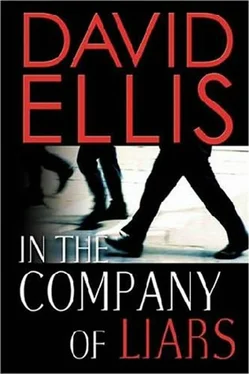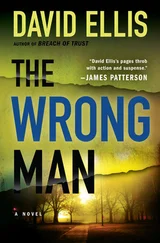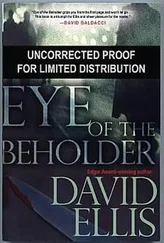“The problem, of course,” McGaffrey says, “is that your daughter was home when you arrived back at your house from wherever you had been.”
Allison nods along.
“Mother-what did you do?” Jessica had cried. “What happened?”
“Tell me, Mother. Tell me what happened.”
“So some time after seven,” her lawyer says, “certainly before eight-thirty, when Jessica arrived, until about two in the morning-let’s call it from eight to two, those six hours-the question is where you were. A question for another time,” he adds.
He is merely going over everything. He won’t spend his first meeting with her interrogating her on details. He’ll probably suggest something later. She could have been at a movie, perhaps, or two movies, something that started at eight o’clock that evening and went into the early morning. This thought has already occurred to Allison. You pay for a movie in cash, usually, and then you sit in a dark theater where no one sees you. Two movies, almost back-to-back, could take over five hours. How she had managed to get dirt all over her hands and face, of course, would be another matter altogether.
“All of this is circumstantial,” he summarizes. “And the one-in-the-morning e-mail, quite honestly, is weird. I can’t think of a rational reason. Neither can they.”
“Criminals make mistakes,” Allison says. “That’s why they get caught.”
McGaffrey smiles. He takes her statement as a general proposition, not a specific indictment of Allison herself. “Do you mind my asking, Allison, why the change in lawyers?”
“You’re the best,” she says quickly. “I have a lot of respect for Paul Riley-”
“Oh, yes.”
“-but I think his forte these days is more of the white-collar variety. You’re the best at what you do.”
Her words could not have been more soothing, Allison is sure, if she had uttered them naked, rubbing his body with lotion on a Hawaiian beach. She has never known a profession that breeds more self-importance and egotism than the practice of law.
Except maybe politics.
“Paul Riley wanted me to cut a deal,” she adds. “I’m not cutting a deal. I want a fighter, and that’s your reputation.”
“You know, I like and respect Paul a great deal,” he says, though Allison senses this is the kind of prelude you typically hear before the knife goes in the back. “But I’ve always felt that people who used to prosecute-they like their adversaries. They sympathize with them. They usually seek compromise.”
“And you?” she asks.
“I don’t cut deals with prosecutors,” he says, his chest heaving a bit. “I don’t like them. Oh, don’t get me wrong,” he adds, leaning forward in his chair. “Personally, they may be the nicest people on the planet. But they are too absolute. Once they make the decision to prosecute, they don’t let anything get in their way. Then they overcharge the crime to scare the shit out of people and force them to plead out. They forget that their job is to be fair, to seek justice. They just want to win. They stop looking around, as soon as they decide to indict. They get tunnel vision. Anything that suggests a defendant’s innocence, at that point, must be discredited. They’re never wrong.”
Allison smiles. This is the kind of outrage you want in an attorney, or at least most people would want.
“This case, perfect example,” McGaffrey says. “I can see how this happened. They have circumstantial evidence that is decent, but not great. Maybe you’re their suspect, maybe not. But then they think you’re lying to them about being romantically involved with Sam Dillon. They put circumstantial evidence together with a lie, and they charge you. They give almost no thought to the fact that Sam Dillon has this big federal bribery probe swirling around him.”
McGaffrey needs to check his dates. The prosecutors didn’t even know about the bribery scandal until after they arrested her.
McGaffrey continues, undeterred. “Sam Dillon, a guy who might have some very incriminating information about this bribery, suddenly turns up dead, but they chargeyou because they can put you at his house at some point and you lied-in their opinion-about being Dillon’s girlfriend. I’ll tell you what, Allison. We’re going to show them a thing or two about due diligence. We’re going to turn this bribery thing upside down. Sam Dillon had skeletons, or someone else did and he was going to give them up. That’s who killed him. And then they send an e-mail to your address to give the cops a suspect on a silver platter.”
“I was framed?” Allison asks.
“Could be. Could be. Who knows? I’m just getting started. Give me a few months and we’ll pull this thing apart like a turkey leg at a-”
“No,” Allison says. “No, no.”
“What’s that?” McGaffrey frowns.
“I’m not moving the trial date, Ron. This thing is crushing me. Crushing my family. I want it done.”
“Allison, this is-we’re talking about six weeks away.”
“I know that. And I understand it makes your job tougher. But Ron, this is a deal-breaker.”
“I can’t try this case in six weeks. I just got this.”
“A deal-breaker, Ron. I want you. Everyone says you’re the best, and that’s what I need. I can afford you. I can afford you and as many associates or partners as you need to get up to speed. I’ll give you a retainer today. How is fifty thousand?”
McGaffrey deflates, mulls it over. She can imagine what he’s thinking. He has a thriving practice, sure, but he’s not the best-he may think so but Allison puts him a step below Paul Riley-and this is a case that will give him national publicity. The change of attorneys, alone, will be news. His picture will be everywhere. Bios about him, profiles in the newspaper. Catching this case will give him instant credibility.
To say nothing of the fact that Allison has put fifty thousand dollars on the table without blinking. Lawyers in private practice relish retainers because they don’t have to chase the client to collect the fee. It’s already there, in a client trust account. McGaffrey will blow through this number by the time the trial is over; her defense will probably run a couple hundred thousand dollars, if not more.
“That’s one condition,” she says. “The trial date.”
“There areconditions.” McGaffrey pronounces the word with distaste. “And more than one.” He gives her the floor, her condition number two.
“Leave my family out of this,” she says. “My ex-husband is one of those lobbyists they’re looking at. You start pointing fingers all around the state capital, one of them will land on him. And that’s a bad thing.”
“That’s a bad thing-because he’s part of your family.”
“That’s a bad thing,” she answers, “because pointing at him would be pointing at me.”
“What are you saying to me, Allison?”
Allison takes a moment. This is a privileged conversation. Nothing that she says to Ron McGaffrey can be repeated, under any circumstances.
She clears her throat.
“The theory goes that a certain ‘someone’ bribed those senators, and Sam found out, and that certain ‘someone’ knew that Sam knew, and killed him before he could talk.”
“That’s the theory, yes.”
“What if I were the one who bribed those senators?” she asks.
Her new lawyer frowns.
She smiles sheepishly at him. “The theory in general sounds pretty good, Ron. But let’s not get too specific. And let’sdefinitely not start accusing my ex-husband.”
ONE DAY EARLIER
SUNDAY, MARCH 21
They trained him. They taught him about weapons, about explosives. They taught him English-not the basics, which Ram already knew, but slang and common phraseology. About American culture. About American security procedures in airports and government buildings. How to walk into a room without being noticed, how to extract information from an asset without giving up any of his own.
Читать дальше












